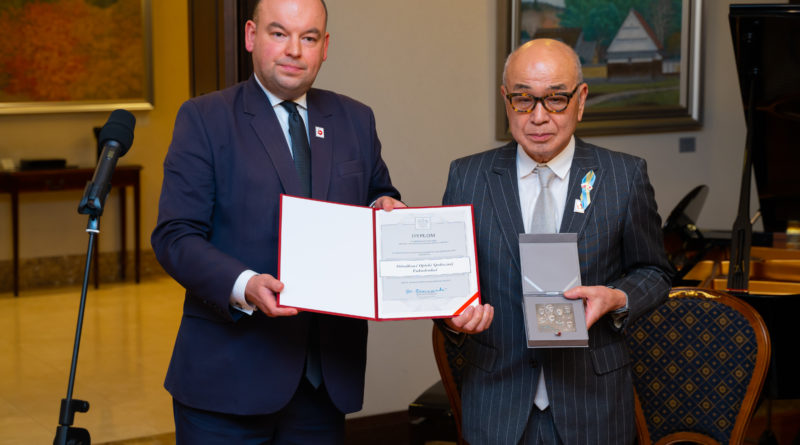Speech by Jan Dziedziczak, the minister in the Chancellery of the Prime Minister responsible for the Polish diaspora
Dear Mr. Ambassador, dear Mr. President of the Fukudenkai Social Welfare Corporation, Ladies and Gentlemen Parliamentarian, Mr. Advisor to the President of the Republic of Poland!
Dear families of the rescued, dear friends of Poland and Japan!
As the mandatary of the government of the Republic of Poland for the Polish Community Abroad’s matters,
I would like to thank you for the invitation to take part in today’s event, the 100th anniversary of commemorating the remarkable history of friendship and cooperation.
For hundreds of years, from the moment of partitions, Poles were deported by Russia, and later by the Soviet Union to Siberia.
It is a symbol of the most difficult labor and tragic history of the Polish nation. It is also a symbol of the steadfastness of our citizens.
In 1918, after 123 years of partitions, when Poland regained its independence, the descendants of Siberian exiles and Polish activists in Władywostok created the Polish Committee of Far East Children.
It was headed by a brave Polish woman – Anna Bielkiewicz, teacher, and daughter of a Siberian exile.
The aim of it was to provide orphans, children, and descendants of Polish prisoners with the possibility of returning to their reborn homeland.
Initially, with the help of the American Red Cross, the evacuated children were accommodated in American barracks.
Soon, the organization’s unit in Władywostok was liquidated.
There was a terrible civil war around. There was hunger and epidemics.
Anna Bielkiewicz decided to ask for help from Japan, which was only the fifth country in the world (in 1919) to recognize Poland’s independence.
She went to Tokyo to ask for the children to be transported to Japan and for their accommodation.
In the Ministry of Defense and the Ministry of Foreign Affairs of Japan, she was heard carefully and with compassion.
She received a document binding all Japanese services to provide all possible assistance.
Thanks to the cooperation of the Japanese Red Cross, in 1920-1922, 765 children were brought to Japan, and then transported by ships of the Japanese Merchant navy to the dreamed and desired Poland.
Here they found a shelter in Wejherowo, where today one of the streets is named after Siberian Children.
In Japan, children found shelter at Fukudenkai Social Welfare Corporation in Tokyo.
At today’s ceremony, we host Mr. Takaaki Ohta – the current President of this outstanding institution, which opened the door to defenseless Polish orphans 100 years ago.
Mr. President, Mr. Ambassador, please accept once again the gratitude of the Republic of Poland for this wonderful gesture of solidarity and friendship.
It is an honor for me to participate in this ceremony.
It is an honor for me that as then Deputy Minister of Foreign Affairs of the Republic of Poland I could pay a visit to you and thank you personally at the headquarters of the Foundation.
But it is not the end of this amazing history.
Today Fukudenkai also demonstrates international solidarity by engaging in help to the Ukrainian refugees in Poland.
For those who felt Russia’s brutal aggression against their country.
We are grateful to Japan, the Japanese, and the Fukudenkai for over 100 years of friendship and solidarity.
That’s why I would like to ask you to rise, and today I would like to present a special distinction to the Fukudenkai Social Welfare Corporation – the Medal on the occasion of the 100th anniversary of Poland regaining independence established by the Prime Minister of the Republic of Poland in memory of the rebirth of the Polish State.
The Fukudenkai, enabling the return of 700 children to Poland, beautifully, took part in the revival of Free Poland.
Mr. President, I kindly ask you to accept this award.
Ladies and Gentlemen, the President of the Council of Ministers confirms that the Medal of the 100th Anniversary of Regaining Independence was awarded on the occasion of the 100th anniversary of Poland regaining independence.
Signed by Mateusz Morawiecki – the President of the Council of Ministers.

